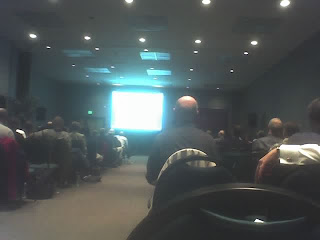NECC Session:
Learning Adventures: Redesigning Learning Environments in Real and Virtual Classrooms by Gary Stager
http://www.stager.org/NECC/My notes:
21st Century Skills – creativity, curiosity, collaboration
We need to build upon the possibility of our kids. Foster their spirit and develop their deep understanding of why we use technology and how we use them.
The choice:
Distance education
Solving Problems: distance, scarcity, skilled educators
reduce personnel costs
deliver standardized content
Distributed learning
anytime, anywhere learning
24/7
expand image of online student
students take online courses for a variety of reasons
we need the best teachers teaching online classes
Can I see your class?
Principles of OMAET
Knowledge is a consequence of experience
What do students do in your class?
Collaborative projects, knowledge sharing and Socratic discussion
Knowledge lives on the Web
Learning occurs best in a Community of Practice
Expertise is distributed
A blend of synchronous and synchronous communication is required
Simulating Intimacy Online via volume & velocity
Be open to emerging technology
-including free, low-cost and decentralized tools
Simplify the user experience
-avoid false complexity
-multiple places to save or submit work
-complicated tools
I don't need to manage a class
Don't count clicks
-What is participation?
-The cocktail party metaphor “This isn't a cocktail party” - What kind of cocktail party do you attend, come and go when you are engaged in the conversation.
Formal & Informal learning takes place
-voice & plagiarism – you get to know the student's voice through their comments and chats
learning and technology
-at same time as formal learning theory course
-can you go through an entire educational technology degree problem without computing?
Learning adventures
goals:
model constructivism & project based learning online
coercion-free (intrinsic motivation)
Encourage risk-taking & collaboration
-Feature an element of surprise
-the teacher's focus is on process
-supports reflective practice
-uses a range of skill & technology in rich ways
-Does not create winners or losers (no bell curve)
"If it were up to me, I would only give two grades... an "A" and "incomplete." ~@garystager
"The cocktail party is a brilliant metaphor for a good learning environment." ~Gary Stager
"Blackboard is great for taking lunch orders and ratting on kids." ~Gary Stager
"simulate intimacy online is done via volume and velocity of discussions" ~Gary Stager
key ingredients
-element of surprise
(m-ath)
-adequate time
-Supportive culture
-“Open everything”
-space for sharing personal reflection
be flexible
-multiple synchronous sessions
-cook a turkey until its done
Authentic problem, real construction materials – Learning Adventures
-must be in a position to figure it out and no fear of failure
-Lady MacBeth Composition (understand the character to compose her theme song)
-Where the Chicago Seven martyrs?
Literacy is the problem – no one reads, no one takes a note, etc.
Teachers should ask for more than one source to support the theory, not limit the sources that can be consulted. (Peer reviewed Journals vs Wikipedia)
Is Ned Kelley a hero? (from Australia)
International example before country example so that biases don't enter into the discussion right at the beginning of the research prompt.
www.stager.org/whoshouldIvotefor
A good prompt is worth 1,000 words
1.a good prompt, challenge, problem or motivation
2.appropriate materials
3.sufficient time
4.supportive culture (including expertise)
community vs. community of practice
overlooked features of a C.O.P.
Elders, experts, newbies
Shared history, mythology, heroes, self-importance
Common commitment to progress
practice!
Entry into the community is based on a willingness to imitate the behaviors of the masters.
The Critical Role of Expertise: community of practice
Technology matters = makes memories



